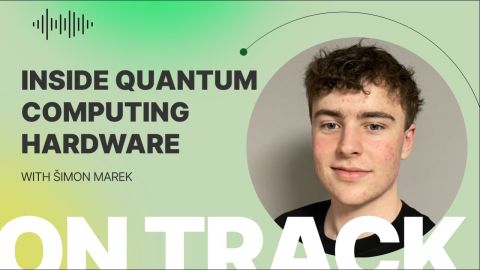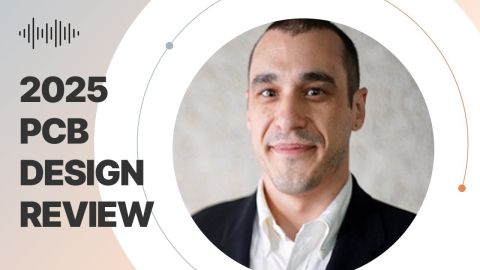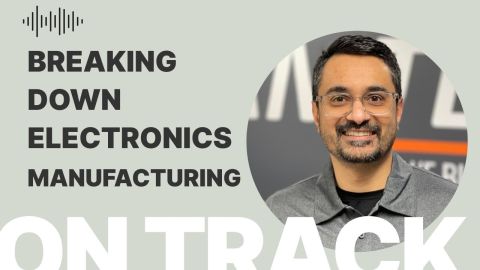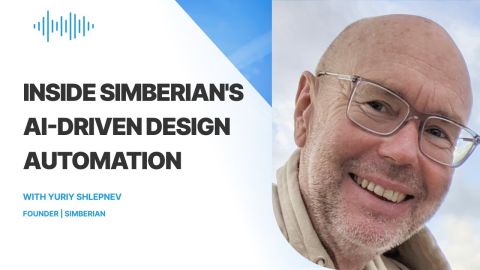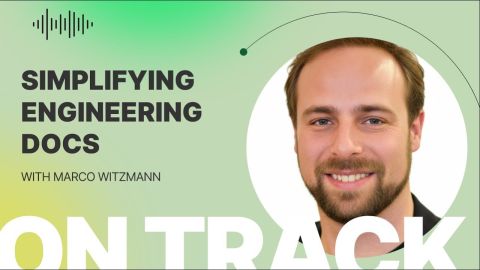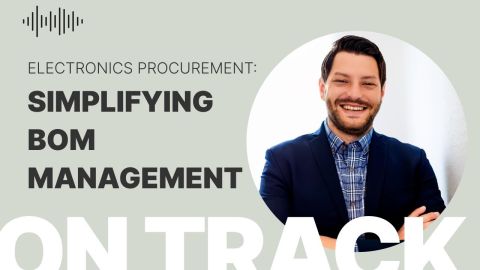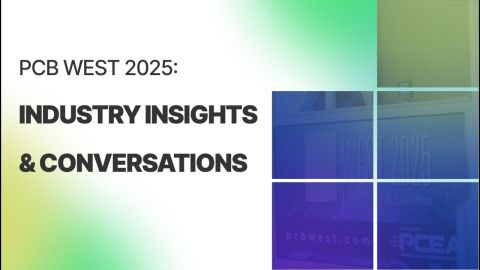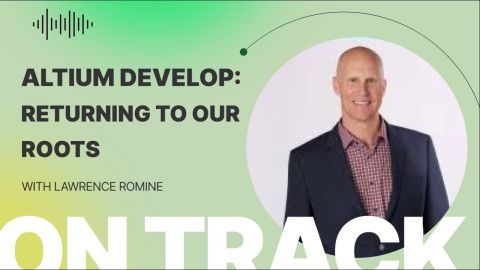OnTrack Year in Review 2023

Welcome to a special edition of the Altium OnTrack Podcast! Join your host, Zach Peterson, as he takes you on a journey through the highlights of the 2023 season, featuring the most intriguing discussions and moments in the world of electronics manufacturing.
Explore the industry's landscape as we delve into topics such as M&A rounds, investments in manufacturing capacity, and the evolving focus on packaging design. Our expert guests (full list below) share insights on the challenges and opportunities faced by companies navigating these dynamic changes.
Gain valuable perspectives on global shifts in manufacturing, with a focus on North America, Europe, and other regions outside Southeast Asia. Discover how companies are adapting to the demands of the market and the role of government intervention in shaping the industry's future.
Dive deep into the world of packaging design and its impact on education and academia. Experts discuss the intricacies of materials used, such as MSAP, and the challenges in achieving the next level of packaging innovation.
Explore the implications of broadening production into countries like Vietnam and India and the time it takes to create a more balanced production portfolio. Understand the complexities of the supply chain and the imperative for industry players to take action.
Witness the industry's commitment to sustainability and efficiency as experts share their insights on incorporating data science into production operations. Discover how companies are embracing new technologies to address challenges and improve processes.
Finally, learn about Altium Designer 24's new collaborative design and simulation tools, offering a glimpse into the future of PCB design. Hear from innovative designers working on cutting-edge projects and gain insights into the latest trends in technology.
Don't miss the opportunity to stay informed, inspired, and on track with the latest developments in electronics manufacturing. Keep learning, stay on track, and join us again in 2024 for more insightful conversations. Thanks to all our viewers for your continued support!
Listen to the Episode:
Watch the Episode:
Highlights
- Shifting Manufacturing Dynamics: Delve into the evolving electronics landscape as manufacturing capacities shift closer to the United States and Europe, shaping the future of innovations in the industry.
- Packaging Design Focus: Explore the transformation in PCB design technology through an in-depth look at the trend towards innovative packaging designs and their impact on the field.
- Emerging Trends: Gain insights into the future of electronics with discussions on cutting-edge topics like robotic vision, new tools for PCB design, and the broader impact of advancing technologies on the electronics market
Transcript:
Zach Peterson:
Hello, everyone, and welcome to this very special edition of the Altium OnTrack podcast. I'm your host, Zach Peterson, and we are here today to review some of the most interesting discussions and moments from the 2023. Season. 2023 was definitely a whirlwind year: we saw several rounds of M&A, we saw new investment in manufacturing capacity closer to the United States and Europe, and we saw a shift in the conversation to focus on packaging design. Let's take a listen to what some of our experts had to say on these matters.
But is this a case of if you build it, the demand will come, or are these companies that need to invest in that capability and build it up, are they always chasing the demand, meaning the demand has to be here first?
Gene Weiner:
Well, this is where the government intervention or government incentive comes in. The demand was not there when they built these huge factories in China and Taiwan. They built it on the [inaudible 00:01:02]. Now, let's say you're running a company, and you want to build a substrate factory, and it's going to take $100 million dollars in equipment, you have to wait two or three years for the equipment, you've got five other competitors already there are trying to set up: what will your stockholders or money people say? How patient are your investors?
Zach Peterson:
So, to what extent do you see this playing out in North America, in Europe, or in other regions of the world that are outside of Southeast Asia?
Jeff De Serrano:
I think in the end of the day, there'll be more of those companies on shore to support the TSMCs and the Intel and the guys that are doing the wafers here, the Texas Instruments, and the [inaudible 00:01:45] guys and so forth. I think you're going to see an influx of people trying to jump into the game. But I have to tell you, it's not the easiest thing to do.
Zach Peterson:
Packaging at the educational level and the academic level is another way to get people to focus on printed circuit boards because they're going to have to learn those same skills.
Mike Creeden:
You're absolutely right with that, Zach. Most people understand that if you looked at a VGA, it is a small circuit board, but it's built with some materials that are not common materials. When you have a 25-micron or dielectric thickness, a 1 mil dielectric thickness, that's not a standard off-the-shelf material. The whole idea of MSAP, ASAP, the semi-adaptive micro-traces, solving micro BGAs, et cetera, this is packaging it at the next level.
Zach Peterson:
And getting to that end state takes a while. There's already broadening out into Vietnam and India. I know the iPhone I think is being assembled or produced in India, and you always see in the news they're having some kind of quality issue, and Apple stock takes a hit for the day, that kind of thing. But I think it's going to take a while to really see all of this start to proliferate out, and maybe get a more balanced production portfolio. Would you agree?
David Schild:
I would. I tell people all the time that we took 30 plus years to dig this hole, and we're not going to dig ourself out of it in 30 weeks, maybe not even 30 months. It's going to take a while for us to get there. But the imperative is to start, Zach, it's not to watch this happen any further. We've recognized that there's a problem, we're educating people as to the nature of the problem and the solution and what follows is action. What has to follow is action.
Zach Peterson:
All the experts we just saw are helping move the industry in a new direction with a new approaches to supply chain management, sustainability and automation. We spoke with several experts working in the field who focus on making electronics manufacturing more sustainable and more efficient. Let's take a look.
How would a production manager, someone working on the floor, how would they react to the idea of bringing data science into production operations? Do they see that as being something that is, I guess, overly difficult for them? Because like you said, if they don't know the difference between mean and median, then you say data science, how do they react to that, like way over their head?
Electronics Manufacturing:
It's been something that I've been countering quite a bit of, and just like anyone starting their own business, there's unexpected challenges you're going to hit. The grass is always greener on the other side until you start really dealing with how to put together an insurance policy, and data protection, even internally.
So, when I got to actually start working with potential customers and clients, that was the prime thing that I started hitting early on was misunderstanding and education of what these tools can really do, and truly defining what is the business problem from a production engineering standpoint that we could use potentially data science to help with.
Geoffrey Leeds:
How to get the things to talk together is always the issue. We've noticed that even in the lab of just getting one thing to talk to another, because you look at things with artificial intelligence, and what you want to do with automation, it requires a lot of data, and understanding in how that data flows and getting it all together. That's the backbone of the industrial IoT that we're talking about, and how to connect those things. There's not an easy solution.
Phil Voglewede:
It's funny because components play such an integral aspect to this entire picture, but it's the most clandestine, almost ill-researched I guess if you will, side of the house. And I think now coming off the back of this shortage, you're finding companies saying, "Okay, well it's great that the markets are lightening up again, but how do we not be in the situation we were two years ago? How do we not let Ford and Apple beat us to the table again?"
Cody Endlich:
We need a stronger community of sustainability for electronics, and I am excited to be building that community and today I'm glad to be talking to you to say we need this community and the listeners to this podcast can be part of that community. It can be more formal, but right now it's rather informal. We just want people talking about this and coming forward with ideas of how to address environmental-social governance, sustainability issues for the value chain based on what is most pressing and relevant, because not everything's relevant to electronics. But what is most pressing and relevant, that we can do that. As these policies evolve and as this kind of peer pressure evolves, those OEMs are wanting more clarity and proof that what the suppliers are giving to them is accurate and reliable.
Zach Peterson:
Following the launch of Altium's new Launchpad program, we had the opportunity to speak with innovative designers from several hardware startups. This was a great opportunity to learn about the newest trends in technology. Let's take a look.
It sounds like this is a good opportunity for a company like yours to really create the de facto standard for power interfaces throughout the powertrain, and then that really creates a moat around your company.
Kelly Scanlon:
Yeah. And that's our main goal. So our main goal is how to get to the market as fast as possible and as efficient as possible using the highest safety protocols, and that's what we're doing right now. That's why our team is working extremely hard to be able to get our footing on the ground and test our system with the early samples that we started working extremely hard to be able to get our footing on with our customers.
Mohamed Badaway:
Let me show you an example: we are working with really large companies, and last week we had a recall event that we were involved in. So, we had the data and the company was using their conventional traceability system, which is the top of the line to do a recall based on a data code. So instead of recalling the entire lot, the entire data code of the two production sites, they were lucky: it was only the small part of the manufacturer that they had to recall. So instead of recalling thousands of words, there was only few hundreds that they had to do that.
Eyal Weiss:
Robotic vision unlocks new markets, new industries, new applications, and it's definitely not like a, winner-take-all type of view for us. We believe that anything that we can do to help get these sorts of devices out there will create these new industries that will then flow back into future hardware sales. So, there's really an intentional decision there that by open-sourcing there, we can really accelerate the adoption of these types of devices out there in the world, and we think that's ultimately a win-win.
Zach Peterson:
To help support innovative PCB designers and hardware engineers, Altium has released new collaborative design tools and simulation tools in partnership with leading EDA software companies. Our next round of guests offer a glimpse at what designers can expect in the future.
So in this new workflow, you say a digital bridge: to me, that sounds a little bit like you're taking the co-designer workflow that people know and enjoy so much and extending it over to simulation.
Bradley Dillon:
Yes, the tool itself essentially very similar to the MCAT co-designer or the MCAT collaboration. It's pretty much on the Altium side, it's a panel where you're going to push the data to the simulation engineer, and that goes again just the same way as the MCAT: it goes into Altium 365 where you have all the data managed there under revision, and then ANSYS accesses the data from there as well, and they'll have a similar tool where they can push and pull data as well as making comments to specific objects.
Zach Peterson:
So I just have to ask, how big is the MID market? Michael, you mentioned a couple of areas, which was smartphones, and then I think you mentioned radar, things like this. So I'm just wondering, how big is that market?
Michael:
Yeah, so the market is very big, so you're totally right, as you mentioned before. So we are active in medical devices, we are active in automotive, in transport, in aviation, in defense. The complete market, we are talking about some hundreds of millions euros. So, it's a huge market all over the world.
Zach Peterson:
What is coming up though to help PCB designers who maybe aren't so SI-savvy because frankly, they're solving layout puzzles every day? What's on the roadmap from Keysight to help those folks?
Jack Henriques:
From my perspective, as a high-speed digital applications product manager, right now electrical performance scan, EP scan is doing really well in helping PCB designers. Our next step is not only to show you the results, but to show you how to fix these problems.
Zach Peterson:
None of these podcast episodes and discussions would be possible without our guests, so I want to give a big thank you to everyone on our guest list. And of course, thank you to all of the viewers who continue to watch this program: you are the reason that we do this. And last but not least, don't stop learning, stay on track, and we'll see you all again in 2024. Thanks, everybody.

